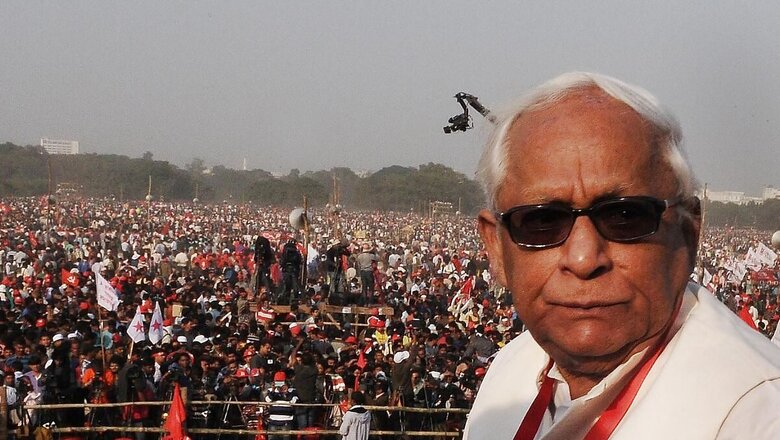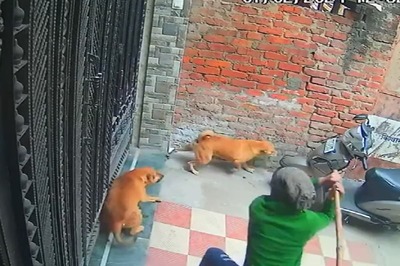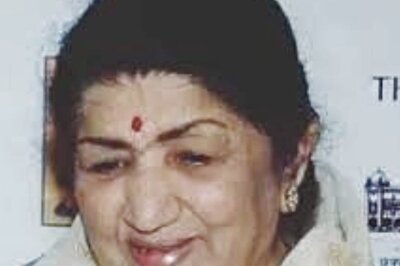
views
“He was old, sick, tired, disillusioned, harassed, slandered, and unappreciated” — each and every word that Gabriel Garcia Marquez used for his protagonist Simon Bolivar in his celebrated work The General in His Labyrinth is an apt fit for Bengal’s former chief minister Buddhadeb Bhattacharjee who breathed his last on Thursday.
Never a textbook Communist, Buddha Babu — as he was fondly called — did not hesitate to take his party head-on regarding issues of West Bengal’s industrial growth. The Bengalis have mostly heard him call himself ‘Bampanthi’ (Leftist). However, the basic ideas of Communism that advocate for the abolition of private property, the establishment of a classless society, and the means of production being owned and controlled by the community or state, were not fully supported by him.
Bhattacharjee embraced capitalism — much to the chagrin of the Communists — and spoke against lockouts and strikes that his party loved. He also embraced private partnership, another stand strong enough to irk the protectors of the Left lineage in the country.
In his time, he epitomised the Bengali ‘bhadralok’ in his crisp white dhoti-kurtas and was the ‘liberator’ who envisioned Bengal’s industrial renaissance. Unfortunately, he is also the one who saw his vision and Bengal’s future go up in smoke.
The Disillusioned ‘Liberator’ Who Failed
The parallels with Marquez’s Bolivar are striking and unmissable, especially given that the elderly man, who breathed his last at 80, was one of the greatest admirers of the Colombian author. He translated two of his non-fiction works into Bengali: The Story of a Shipwrecked Sailor and Clandestine in Chile. And he was working on more such translations of his works, some essays and papers of other renowned authors.
Bhattacharjee was a true patron of Bengali culture and literature. He scripted over a dozen books and translation works, continued writing letters to his comrades and penned articles based on contemporary politics — regional, national and global — for the party’s mouthpiece Ganashakti.
The similarities with Marquez’s Bolivar don’t end here: He was physically ailing, likely weary from the repeated defeats his Communist Party of India (Marxist) faced in every election except in Kerala, vilified by his political opponents, and unappreciated by the very Bengalis he sought to liberate. The book, in which Marquez shaped his ‘general’ Boliver, is based on the final days of the man known as the liberator of many South American nations.
Buddha Babu tried to make his party evolve but, in the hurried process, the path to progress was lost. The CPI(M)-led Left Front government introduced Operation Barga in West Bengal in 1978. It was a land reform movement that aimed to record and protect the rights of sharecroppers — known as bargadars — by ensuring them legal recognition and security of tenure.
From ‘Operation Barga’ to ‘Operation Dawn’
Under Operation Barga, the sharecroppers were given formal rights to the land through documentation, preventing their eviction by landlords and granting them a more significant share of the produce. This initiative worked and it significantly improved the socio-economic conditions of rural farmers, leading to increased agricultural productivity and rural empowerment in the state. The land reform by the Left has been seen as the most path-breaking and revolutionary decision by Bengal’s longest-serving Leftist chief minister Jyoti Basu. The government stood with the farmers and that’s how the tide turned in the state. Congress faded and the Left citadel became impregnable.
However, the process also gave birth to militant workers unions. The plight and the flight of capital brought scores of educated but unemployed youth. As the chief minister, Bhattacharjee sought to change this idea — ‘Chasha er Byata Chasha Keno Hobe’ (Why would a farmer’s son become a farmer). He invited capital to the state and envisioned dreams of ‘Bengal Shining’.
However, the dreams were flawed, given the consequences. In Singur, Nandigram and Lalgarh, the former chief minister chose to use force and stood witness to the decision of agricultural land being forcibly acquired for industry. He went against the very basic idea of Communism, which had brought an uninterrupted rule of Leftists. Overdependence on bureaucrats and police and use of excessive force leading to police brutality caused his ‘undoing’ and paved the way for the rise of Mamata Banerjee.
The ‘Spotless’ White Kurta
In May 2011, after the Left Front was decisively defeated, Bhattacharjee was seen walking out of the Writers’ Building — then the seat of power — refusing to ride the white Ambassador meant for the chief minister. He got into the car the party sent for him and went straight to Lal-Bari, the CPM headquarters in Kolkata. Until his illness confined him, he visited the party office almost every day.
In 2016, during the assembly elections, he addressed mass rallies in Kolkata alongside Rahul Gandhi. Even in the 2021 and 2024 elections — both assembly and parliamentary — his party used his speeches to motivate cadres, and finally, an AI-driven Buddha Babu reached the masses. Since 2011, he lived in a two-room flat in south Kolkata’s Palm Avenue, never faced any corruption charges and none ever accused him of nepotism, or encouraging dynasty politics.




















Comments
0 comment